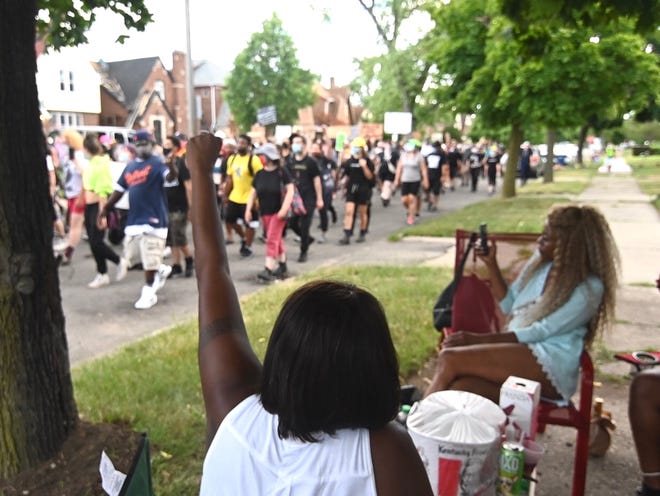Protesters sue over Detroit police response; city countersues
 Sarah Rahal
Sarah RahalCorrection: This story and headline have been updated to reflect that the ACLU filed an amicus brief in support of a lawsuit filed against the Detroit Police Department by Detroit Will Breathe. The story also has been updated to correct the dates when the city filed a response to the lawsuit and when Detroit Will Breathe filed a counterclaim.
Detroit —Detroit Will Breathe is suing the Detroit Police Department over its response to protests in the city since May. The city is countersuing, claiming the gatherings amounted to a conspiracy for which any damages should be paid by demonstrators.
Protesters who were injured by police filed a lawsuit in late August alleging that their First Amendment free speech rights were violated.
The city filed a counterclaim, attempting to hold Detroit Will Breathe and protesters liable for civil conspiracy. Police argue that the protest organizers are responsible for paying for any damages that resulted from protesters' actions.

Detroit Will Breathe moved to dismiss the claim, saying it is without merit. On Friday, the ACLU of Michigan filed an amicus brief saying the counterclaim should be dismissed.
Following the deaths of George Floyd and Breonna Taylor, Detroit Will Breathe has been marching in Detroit for more than 150 days.
Over that time, officers and protesters have skirmished, resulting in dozens of arrests of protesters and police use of tear gas, zip ties and the use of riot gear. In one instance, a police car drove through a group of protesters. The protests have been more calm lately.

During the protests, people have denounced the police, called for Chief James Craig's resignation and spoken out against police violence and racism. ACLU senior staff attorney Phil Mayor said that's not enough to hold organizers liable.
"What Detroit Will Breathe has said is protected speech; they're exercising their right of dissent, their right to express their dissatisfaction with the current state of politics and policing in Detroit," Mayor said. "The city's attempt to hold them liable for individual acts at the protest that weren't committed by the individual protesters who are in a lawsuit is an attempt to suppress their speech.
"It's an attempt to manipulate the judicial process to do what police violence in the streets could not, which is to silence protesters," he said.
Following the killing in July of Hakim Littleton by Detroit police, a coalition called on Detroit police to release video footage and returned to the scene on the city's east side.
Littleton was killed after video showed he aimed a pistol about 2 feet from a police officer's face and fired two shots, missing the officer. Police returned fire. Police officials said the 20-year-old was pronounced dead in an area hospital.
Hours after the incident, with an unruly crowd throwing objects at officers at the shooting site at McNichols near San Juan, Craig released video of the Littleton incident, saying it showed officers were forced to shoot because their lives were in danger.
A dozen people were arrested and some hospitalized, including organizers who said they received head lacerations and were injured by being placed in chokeholds by police.
A federal judge in Detroit denied a motion in September by the city of Detroit and the Police Department to ban some Detroit Will Breathe protest activities they said are violent.
The judge added that the city and the department "lack a factual basis" for their motion.
Police have alleged police officers were hit by projectiles and bottle rockets during recent demonstrations and that officers "had lasers pointed in their eyes, and were attacked by protesters" before the judge issued a temporary restraining order.
According to the suit, the city's counterclaim is based on Detroit Will Breathe's social media posts they say incited violence and protests. The posts included a tweet urging people to gather to protest the police killing of Littleton; an Instagram post complaining about the City Council not enacting a resolution in support of protesters and statements urging the ouster of Craig, assailing his leadership and trustworthiness.
"I continue to stand by the Detroit Police Department's actions," Craig told The Detroit News on Friday. "We're investigating any claims of wrongdoing and will continue to do that."
Detroit Will Breathe organizer Tristan Taylor is a plaintiff in the case after he was involved in the July incident.
"The ACLU believes in the far-reaching implications of such actions," he said. "If the city of Detroit says this is a conspiracy, it would call into question the basic democratic right of protesting."
In the ACLU brief, attorneys cite a 1982 Supreme Court decision in which shop owners attempted to hold the NAACP of Mississippi liable for incidents that occurred during a boycott campaign the NAACP organized. The High Court found that the suit violated the First Amendment.
"You're attempting to hold protest organizers liable for speaking out against racial injustice," Mayor said. "You can hold those individuals who committed a criminal act liable. You can take them to court. But what you can't do is try to sue racial justice protest organizers and bankrupted them in order to silence their speech and their organization, because that violates their right to speech, and it violates their right to assemble and band together, to seek change."
Staff Writer George Hunter contributed.
srahal@detroitnews.com
Twitter: @SarahRahal_